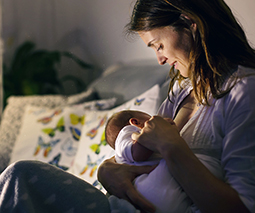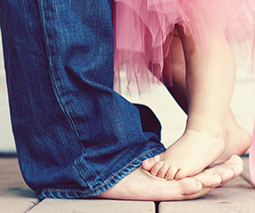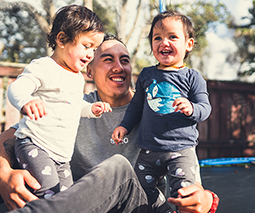Emotional abuse: Is your partner ‘gaslighting’ you?

Dr Stephanie Sarkis is a counsellor and the author of Gaslighting: How To Recognise Manipulative and Emotionally Abusive People – and Break Free. Babyology podcast Feed Play Love spoke to Dr Sarkis about the pain of gaslighting within a relationship.
- When conversations stop after having children
- To the mum in a relationship that’s stopped feeling ‘right’
- What becoming a parent really does to your relationship
What is gaslighting?
Gaslighting is a series of manipulative behaviours and the goal is to make the victim feel off-kilter, make them question reality and rely even more on the gaslighter for their version of what’s real.
The term stems from a 1940’s film starring Ingrid Bergman where a manipulative husband tries to make Bergman’s character feel that she was emotionally unstable. He dims the gas lights in his home and then insists to his wife that she is imagining the change. Although we’ve done away with the actual gas lights used in the film, this sort of behaviour continues to – sadly – be very common.
Listen to Dr Stephanie Sarkis on Feed Play Love:
Despite the slippery and often covert behaviours that characterise gaslighting being quite hard to put your finger on, Dr Sarkis says they are very real, more common than we might think and indeed a form of abuse.
“I think we’re starting to recognise it as a form of abuse now,” she explains. “Especially when someone tries to leave, the gaslighter will really increase their abusive behaviours to get the person to stay.”
An evil master plan?
So is gaslighting behaviour usually part of a nasty masterplan to manipulate another person? Dr Sakis says this isn’t always the case.
“Sometimes they’re aware they’re doing it and sometimes they aren’t,” she says. “So sometimes people do it on purpose. They want to try to alienate the children from you. Or they want to make you dependent on them. Other people may have learned that behaviour as a result of their parents being gaslighters, so they learned this is how you communicate within a relationship.”
“When someone realises that they have gaslighting behaviours, it’s much more likely that they’re going to be able to recover from them because they’re able to get help. But if you’re doing this on purpose, you’ll feel like you’re in the right and everyone else is wrong, it’s very hard for people to get help when that’s the case. But either way, people are so 100 percent responsible for their behaviour at all times.”

Manipulation and destabilising
Dr Sarkis says gaslighting behaviour can take lots of forms, and both men and women can be the victims of this phenomenon. In the early stages, things like hiding belongings and accusing you of being irresponsible, they may cast you as the ‘bad parent’ and themselves as the good one.
For couples with small children that might mean – in the late stages – the abusive partner suggests children call their other parent by their first name.
Constant lying is another classic gaslighter behaviour, she says, even about things that seem inconsequential.
Dr Sarkis notes that all of this manipulation and undermining means that the victim of the gaslighting finds it harder to leave the relationship – which is part of the motivation.
The gaslighter will try to “convince you that there’s something wrong to you or that you’re not to be trusted or that you can’t live independently,” she explains. “You start believing that it’s really hard to leave. And then when there are kids involved. That brings in a whole other aspect to it too, that you have a co-parent that is not healthy.”

It’s important to seek counselling
Gaslighters will often do everything possible to avoid facing their behaviours, making counselling a tricky option. But Dr Sarkis says that seeking counselling is a brilliant idea if you’re the target of a gaslighter.
“If your partner doesn’t want to go to counselling, I recommend that you go to counselling to at least figure out how to manoeuvre the situation and what to do if you are considering leaving.”
A counsellor is a “neutral person who does not pick sides,” Dr Sarkis explains. “I think that’s really helpful when you’re talking about something where someone has told you that everyone thinks you’re crazy and you start believing it. Then when you go to a counsellor you realise that you not. ”
“You just need to talk to somebody about what’s going on because some of this stuff is really hard to believe for other people because it gets so crazy.”

Constant put-downs
When women, in particular, are being gaslighted, they might challenge their abusive partner’s behaviour only to find themselves accused of being crazy, hysterical, hormonal, sensitive, lacking in humour or similar by their abuser.
“Even as someone’s joking but has a biting tone to it, they’re really not joking with you. It’s criticism cloaked as humour,” Dr Sarkis explains.
So what’s the difference between a gaslighting partner’s response to being called out on their behaviour and a more healthy partner’s reaction? Dr Sarkis says that a gaslighter will often become outraged, accusatory or angry, whereas a more supportive partner will be keen to work things out even if it’s a bit challenging for them.
Dr Sarkis’ book has lots more information about gaslighting and how to extract yourself from a relationship with a gaslighter.
You can also listen to Shevonne Hunt’s full interview with Dr Sarkis on Feed Play Love.









